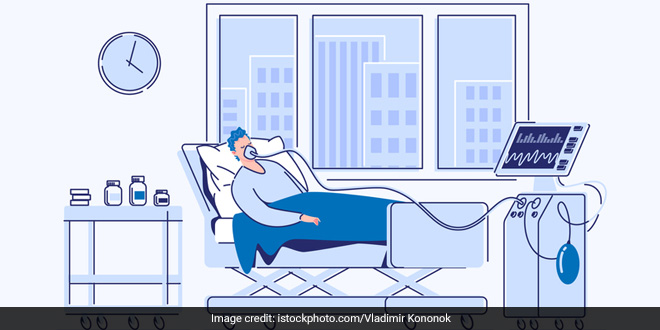Highlights
- Researchers examined data for 1,128 patients from 235 hospitals
- Mortality rates were higher in men (28.4%) versus women (18.2%): Study
- Mortality rate in patients aged 70 years or over was at 33.7 per cent: Stud
Birmingham: A global study reveals that the patients undergoing surgery after contracting coronavirus are at a greater risk of postoperative death. Researchers found that amongst SARS-CoV-2 infected patients who underwent surgery, mortality rates are high among the patients admitted to intensive care, and underwent operation, after contracting the virus in the community. The new global study is published in the journal The Lancet. Researchers examined data for 1,128 patients from 235 hospitals. A total of 24 countries participated, predominantly in Europe, although hospitals in Africa, Asia, and North America also contributed.
Also Read: COVID-19 May Never Go Away Even With A Vaccine: Report
Experts at the University of Birmingham-led NIHR Global Research Health Unit on Global Surgery have now published their findings that SARS-CoV-2 infected patients who undergo surgery experience substantially worse postoperative outcomes than would be expected for similar patients who do not have SARS-CoV-2 infection.
Overall 30-day mortality in the study was 23.8 per cent. Mortality was disproportionately high across all subgroups, including elective surgery (18.9 per cent), emergency surgery (25.6 per cent), minor surgery such as appendicectomy or hernia repair (16.3 per cent), and major surgery such as hip surgery or colon cancer surgery (26.9 per cent).
Also Read: Study Reconfirms Coronavirus Has Higher Transmission Rate Among Close Contacts: ICMR
The study identified that mortality rates were higher in men (28.4 per cent) versus women (18.2 per cent), and in patients aged 70 years or over (33.7 per cent) versus those aged under 70 years (13.9 per cent). In addition to age and sex, risk factors for postoperative death included having severe pre-existing medical problems, undergoing cancer surgery, undergoing major procedures, and undergoing emergency surgery.
Report co-author Aneel Bhangu, Senior Lecturer in Surgery at the University of Birmingham, commented,
We would normally expect mortality for patients having minor or elective surgery to be under 1 per cent, but our study suggests that in SARS-CoV-2 patients these mortality rates are much higher in both minor surgery (16.3 per cent) and elective surgery (18.9 per cent). In fact, these mortality rates are greater than those reported for even the highest-risk patients before the pandemic; for example, the 2019 UK National Emergency Laparotomy Audit reported 30-day mortality of 16.9 per cent in the highest-risk patients, and a previous study across 58 countries reported a 30-day mortality of 14.9 per cent in patients undergoing high-risk emergency surgery.
Also Read: COVID-19 Crisis: WHO Warns That First Wave Of Pandemic Not Over; Dampens Hopes
“We recommend that thresholds for surgery during the SARS-CoV-2 pandemic should be raised compared to normal practice. For example, men aged 70 years and over undergoing emergency surgery are at particularly high risk of mortality, so these patients may benefit from their procedures being postponed.”
Patients undergoing surgery are a vulnerable group at risk of SARS-CoV-2 exposure in hospital. They may be particularly susceptible to subsequent pulmonary complications, due to inflammatory and immunosuppressive responses to surgery and mechanical ventilation. The study found that overall in the 30 days following surgery 51 per cent of patients developed pneumonia, acute respiratory distress syndrome, or required unexpected ventilation. This may explain the high mortality, as most (81.7 per cent) patients who died had experienced pulmonary complications.
Also Read: COVID-19 Vaccine Developed In China Shows Promising Results In Early Trials: Report
Report co-author Dmitri Nepogodiev, Research Fellow at the University of Birmingham commented,
[corona_data_new]Worldwide an estimated 28.4 million elective operations were cancelled due to disruption caused by COVID-19. Our data suggest that it was the right decision to postpone operations at a time when patients were at risk of being infected with SARS-CoV-2 in hospital. There’s now an urgent need for investment by governments and health providers into measures to ensure that as surgery restarts patient safety is prioritised. This includes the provision of adequate personal protective equipment (PPE), the establishment of pathways for rapid preoperative SARS-CoV-2 testing, and consideration of the role of dedicated ‘cold’ surgical centres.
















